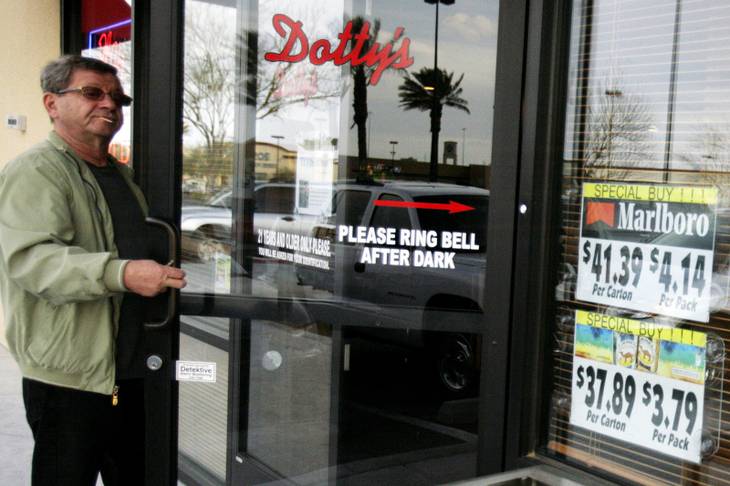Archives
- Resort Association seeks ban on slot taverns like Dotty’s (5-19-2011)
- Dotty’s, taverns and gaming: The issue that will not die (5-17-2011)
- Dotty’s sues Clark County Commission in federal court, says ordinance designed to put it out of business (5-17-2011)
- Is Dotty’s a tavern? Amid battle, big casinos say no (3-29-2011)
- Ralston: Gamers and taverns and Dotty’s, oh my (3-11-2011)
- County to hold separate meetings for liquor, gaming licenses (1-18-2011)
- County puts moratorium on new tavern licenses (12-22-2010)
VEGAS INC Coverage
A second chain of Dotty's-like Las Vegas-area neighborhood gambling establishments is suing Clark County and the County Commission over an ordinance aimed at requiring them to operate more like traditional gaming taverns.
Jackpot Joanie's, which has five county-licensed or pending locations, filed suit in U.S. District Court in Las Vegas on Thursday over the ordinance that became effective April 19.
The moves against the Dotty's business model, supported by big casinos and traditional taverns are aimed at requiring the mini-casino like businesses to operate in a manner in which gaming is clearly incidental to food and drink operations.
Like Dotty's, which also sued the county this week, attorneys for Jackpot Joanie's say its due process rights were violated by the ordinance.
"The purpose of this ordinance was and is to unreasonably interfere with Jackpot Joanie's business and destroy its profits, causing Jackpot Joanie's to suffer irreparable harm," said Thursday's suit, filed by attorneys Timothy R. O'Reilly, John F. O'Reilly and Claudia K. Cormier of O'Reilly Law Group in Las Vegas.
Jackpot Joanie's says in its lawsuit it's licensed as a tavern, even though like Dotty's its slot machines are not embedded in a bar and instead are freestanding and arranged in groupings "that are more appealing to Jackpot Joanie's customer base" – apparently women like Dotty's base.
"Jackpot Joanie's business plan primarily appeals to patrons who like the convenience of a local, smaller tavern that has a clean, safe, bright light environment," its lawsuit says.
"Unfortunately, the tavern business model used by Jackpot Joanie's and some of its competitors has now been mischaracterized as a 'slot parlor' or 'slot arcade' and not a 'traditional' tavern, where gaming clearly is incidental to another, primary business conducted at the location, such as a restaurant," the lawsuit says.
The lawsuit complains that prior to enacting the ordinance, county staff prepared a "grossly inadequate" business impact statement and that affected businesses couldn't properly advise the county on its impacts because of a scattershot approach in which four competing proposals were being considered.
"Thus when the hearing on the (ordinance) amendments was finally convened, in direct contraventions of (Nevada law), the board (of commissioners) lacked the real and necessary information on the impact of the amendments on the businesses that the ultimate ordinance would affect," the lawsuit says.
It complains that on the eve of the April 5 hearing on the ordinance, certain members of the commission met secretly with the Nevada Resort Association and the Tavern Owners Association at the commission office "and struck a private deal to support and propose only a single version of the bill" -- and that Jackpot Joanie's was not a party to this alleged deal.
The amendment calls for taverns, even most of those currently licensed, to have a traditional bar-top structure with at least eight of their 15 slot machines embedded in the bar.
The suit claims the county violated a state law allowing the county to limit competition only in certain industries, "which do not include gaming or liquor sales."
" There is no legitimate governmental purpose for requiring a tavern to contain the physical structure of a bar in which machines can be embedded when the county's definition of a tavern specifically includes a lounge without a bar," the lawsuit says. "There is no legitimate governmental purpose for requiring a tavern to have eight of its slot machines embedded in a bar.
"The process in which this ordinance was proposed, considered, noticed to the public (both in advance and through official post-meeting minutes) and passed failed to provide Jackpot Joanie's a meaningful opportunity to be heard at a meaningful time and were fundamentally unfair and violated the due process requirements of the Nevada and United States Constitutions," the suit says.
The suit seeks an injunction blocking enforcement of the ordinance, though no hearing on an injunction hearing in either of the two lawsuits has been set.
Clark County has not yet responded to either the Dotty's or Jackpot Joanie's lawsuits.

